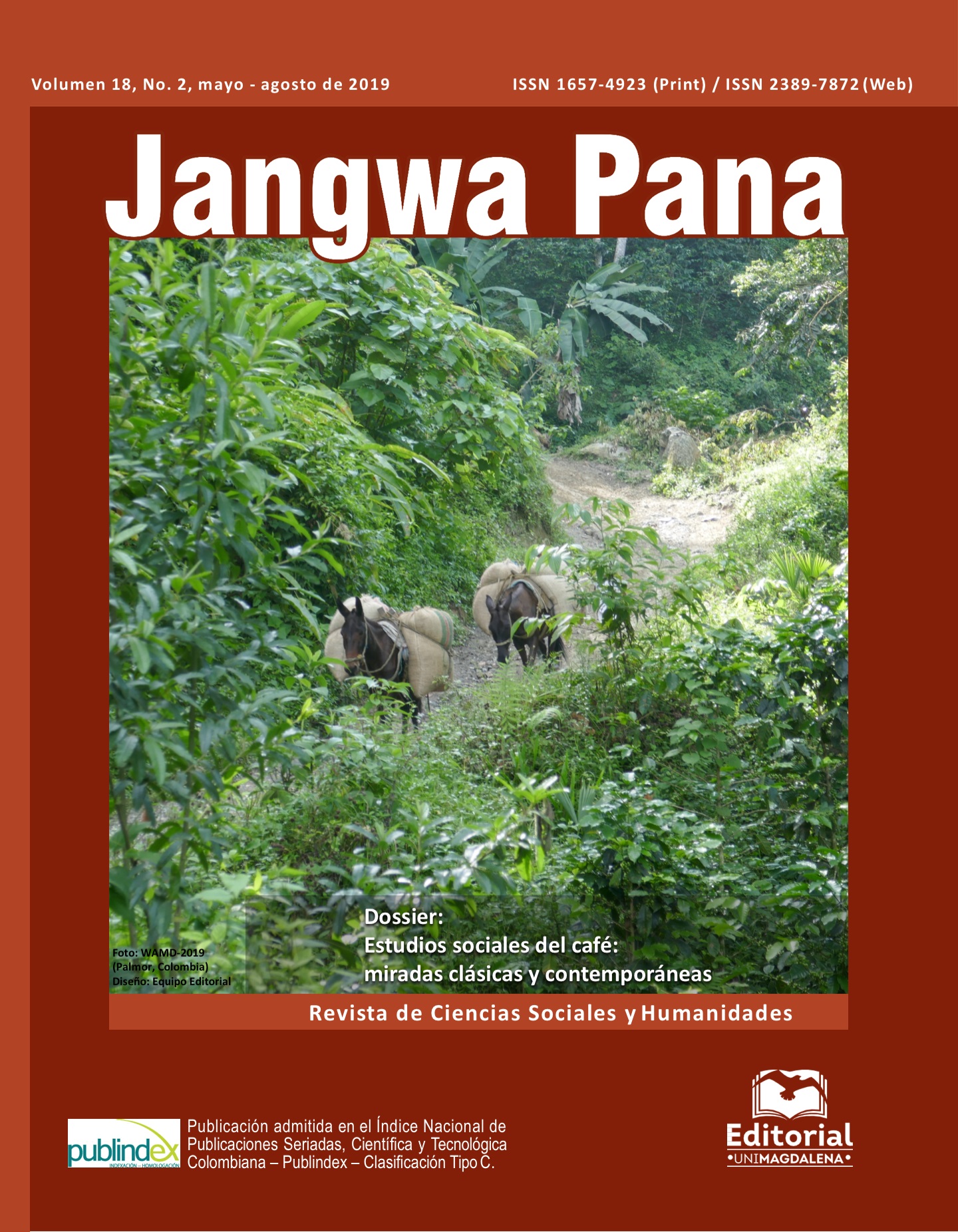Infraestructuras de Confianza y Sostenibilidad Una mirada a las relaciones entre sostenibilidad y estandarización en la política internacional de producción cafetera
Contenido principal del artículo
Resumen
Descargas
Detalles del artículo
Citas
Bain, C., Ransom, E., y Higgins, V. (2013). Private Agri-Food Standards: Contestation, Hybridity and the Politics of Standards. International Journal of Sociology of Agriculture and Food, 20(1), 1-10.
Bain, C. (2010) Structuring the Flexible and Feminized Labor Market: GlobalGAP Standards for Agricultural Labor in Chile. Signs, 35(2), 343-370. https://www.jstor.org/stable/10.1086/605479.
Bain, C. y Dandachi, T. (2014). Governing GMOs: The (Counter)Movement for Mandatory and Voluntary Non-GMO Labels. Sustainability, 6(12), 9456-9476.
Bain, C. y M. Hatanaka. (2010). The Practice of Third-Party Certification: Enhancing Environmental Sustainability and Social Justice in the Global South? In V. Higgins and W. Larner (eds). Calculating the Social: Standards and the Re-configuration of Governing [pp. 56-74]. Basingstoke: Palgrave MacMillan.
Bain, C. y Selfa. T. (2017). Non-GMO vs Organic Labels: Purity or Process Standards in a GMO Contaminated Landscape. Agriculture and Human Values.
Barham, B. y Weber, J. (2012). The Economic Sustainability of Certified Coffee: Recent Evidence from Mexico and Peru. World Development, 40(6), 1269-1279
Bowker, G. y Star, S.L. (1999) Sorting things out. Classification and its consequences. London: MIT Press.
Brooks, D. (1992) The challenge of sustainability: Is integrating environment and economy enough? Policy Sciences, 25, 401-408.
Busch, L. (2010) Can Fairy Tales Come True? The Surprising Story of Neoliberalism and World Agriculture, Sociologia Ruralis, 50(4)
Busch, L. (2011) Standards: Recipes for Reality. London: MIT Press.
Hatanaka, M. 2010. Trust, Certification, and Partnership in an Organic Shrimp Network: Rethinking Transnational Alternative Agrifood Networks. World Development 38(5),706-716.
Hichliffe, S. (2007) Geographies of Nature. Societies environments ecologies. London: Sage.
ICO, International Coffee Organization (2013) History http://www.ico.org/icohistory_e.asp?section=About_Us
Lampland, M y Leigh Star, S. (2009) Standards and Their Stories: How Quantifying, Classifying, and Formalizing Practices Shape Everyday Life. Ithaca: Ithaca University Press.
Law, J. y Urry, J. (2004) Enacting the social, Economy and Society, 33(3), 390-410, DOI: 10.1080/0308514042000225716
Loconto, A. y Fouilleux, E. (2014). Politics of private regulation: ISEAL and the shaping of transnational sustainability governance. Regulation & Governance, 8(2), 166-185.
Loconto, M y Busch, L (2010). Standards, techno-economic networks and playing fields: Performing the global economy. Review of International Political Economy. 3, 507, 536
MacNeill, J., Winsemius, P. y Yakushiji, T. 1991. Beyond Interdependence. The Meshing of the World's Economy and the Earth's Ecology. Oxford: Oxford University Press.
Maertens, M. (2016). Private Sustainability Standards in the Ugandan Coffee Sector: Empty Promises or Catalysts for Development? 235004.
Pinto, Gardner, Mcdermott y Ayub. (2014). Group certification supports an increase in the diversity of sustainable agriculture network–rainforest alliance certified coffee producers in Brazil. Ecological Economics, 107, 59-64.
Redclift, M. (2005) Sustainable Development (1987–2005): An Oxymoron Comes of Age, Sustainable Development 13(4), 212–227.
Renard, M. (2014) In the name of Conservation: CAFE Practices and Fair Trade in México. Journal of Business Ethics, 92, 287-299.
Rueda X y Lambin E. (2014) Global agriculture and land use changes in the 21st century: Achieving a balance between food security, urban diets and nature conservation. The Evolving Sphere of Food Security (ISBN 978-0-19-935406-1)
Thévenot, L. (2009). Governing Life by Standards: A View from Engagements. Social Studies of Science 39(5): 793-813.
Timmermans, S. y Epstein, S. (2010). A world of standards but not a standard world: Toward a sociology of standards and standardization. Annual Review of Sociology, 36, 69-89.
UN, United Nations. (1987) Report of the World Commission on Environment and Development Our Common Future. http://conspect.nl/pdf/Our_Common_Future-Brundtland_Report_1987.pdf
UN, United Nations. (1992) United Nations Conference on Environment & Development Río de Janeiro, Brazil, 3 to 14 June 1992. AGENDA 21. http://sustainabledevelopment.un.org/content/documents/Agenda21.pdf
UN, United Nations. (2002) Report of the World Summit on Sustainable Development. Johannesburg, South Africa, 26 August- 4 September 2002 http://www.un.org/jsummit/html/documents/summit_docs/131302_wssd_report_reissued.pdf
Urry, J. y Macnaghten, P. (1998) Contested Natures. London: Sage.
Van Der Kamp, M. (2012) Coexisting Organic Standards: Setting Boundaries, Navigating Multiplicity and Enacting Commonality. En M. Barbier and B. Elzen (Eds.), System Innovations, Knowledge Regimes, and Design Practices towards Transitions for Sustainable Agriculture. Inra [online].
Woolgar, S., Coopman, C. y Neyland, D. (2009). Does STS Mean Business? Organization. 16(1), 5–30

